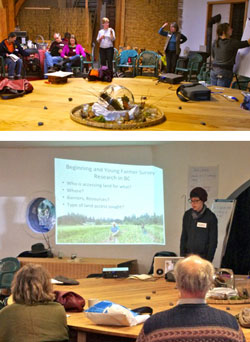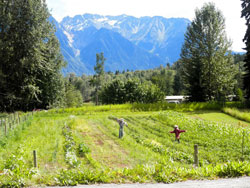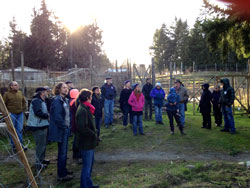
About the authors: Dr. Hannah Wittman and Jessica Dennis are researchers at UBC’s Faculty of Land and Food Systems. Over the past year, they teamed up with the Vancouver based non-profit FarmFolk CityFolk on a project funded by the Real Estate Foundation of BC to characterize the role of alternative models of farmland access to strengthen sustainable regional food systems.
 The number of young farm operators has been declining in BC while the average age of farmers is at an all-time high. The cost of farmland in BC has also been steadily rising – our research found that the cost of land is the most significant barrier for prospective and beginning farmers. An older farming population without a next generation to take over has serious implications for farmland and for food production in the province.
The number of young farm operators has been declining in BC while the average age of farmers is at an all-time high. The cost of farmland in BC has also been steadily rising – our research found that the cost of land is the most significant barrier for prospective and beginning farmers. An older farming population without a next generation to take over has serious implications for farmland and for food production in the province.
On a brighter note, we found that communities are finding creative solutions to facilitate farmland access – including alternative models to private ownership of expensive farmland. Farmland trusts involve cooperative land access agreements and shared management costs, and often offer longer-term tenure security to potential farmers as compared to conventional farm leases. Other innovative models include land cooperatives, long-term leases on public land, and incubator plots on land managed by educational institutions.
 Our research documented 60 such examples across BC, and characterized the different models being used, the motivations for using them and the benefits and challenges of these models. Our assessment of alternative farmland access models revealed that there is greater growth in short-term land access opportunities (e.g. incubator farms). Despite the growing interest in farmland trusts, we found a relative scarcity of examples supporting long-term land access opportunities offering the tenure security that is necessary for long-term farm planning and investment. Stemming from this finding, the project team is contributing to the advancement of an initiative to research and develop farmland trust models specific to the BC context.
Our research documented 60 such examples across BC, and characterized the different models being used, the motivations for using them and the benefits and challenges of these models. Our assessment of alternative farmland access models revealed that there is greater growth in short-term land access opportunities (e.g. incubator farms). Despite the growing interest in farmland trusts, we found a relative scarcity of examples supporting long-term land access opportunities offering the tenure security that is necessary for long-term farm planning and investment. Stemming from this finding, the project team is contributing to the advancement of an initiative to research and develop farmland trust models specific to the BC context.
 A key element of the project was involving community stakeholders and using the research as a means to support community farmers and organizations. A two-day long Community Farms Roundtable hosted by O.U.R. Ecovillage in Shawnigan Lake provided an exciting opportunity for stakeholders to network and learn from one another, for the research findings to be presented, and for next steps to be identified with the community. Our webinar presentation is available online.
A key element of the project was involving community stakeholders and using the research as a means to support community farmers and organizations. A two-day long Community Farms Roundtable hosted by O.U.R. Ecovillage in Shawnigan Lake provided an exciting opportunity for stakeholders to network and learn from one another, for the research findings to be presented, and for next steps to be identified with the community. Our webinar presentation is available online.
The Farmland Access Research Project has its own website where you can learn more.
————————————————————————————–
Sustainable Food Systems is one of the Real Estate Foundation’s grant program focus areas. We have a particular interest in supporting land use initiatives that remove barriers and/or contribute to new approaches and practices for sustainable food systems in BC. We have made two grants to the Centre for Sustainable Food Systems at UBC Farm: our 2009 grant ($12,000) helped with a land use planning and education exercise associated with integrating UBC Farm with the larger community; our 2013 grant ($14,569) was for the Farmland Access Research Project described in this article.
See also:
Project Spotlight story – UBC Farm: Model for Urban Agriculture (2010)
Blog series on Young Agrarians Land Access Guide 2.0:
- CEO Blog: Land Access Guide for Young Agrarians
- The Landscape of BC’s Local Food Movement
- Options for Accessing Precious BC Farmland
SHARE